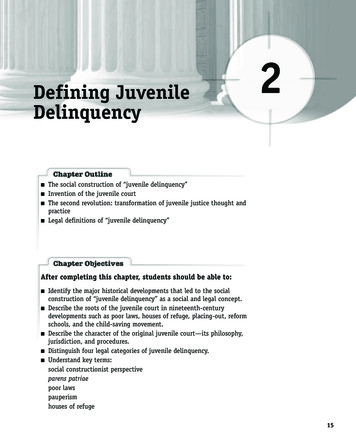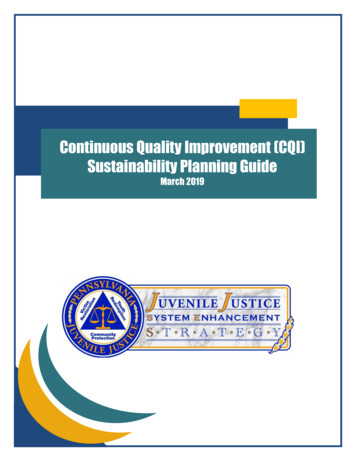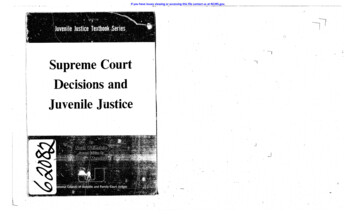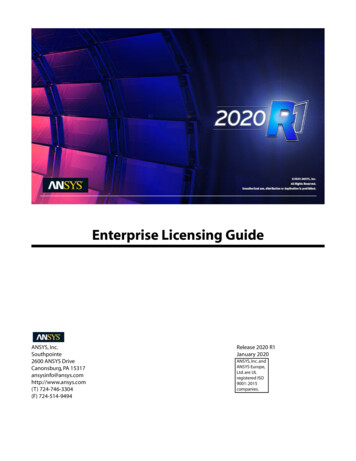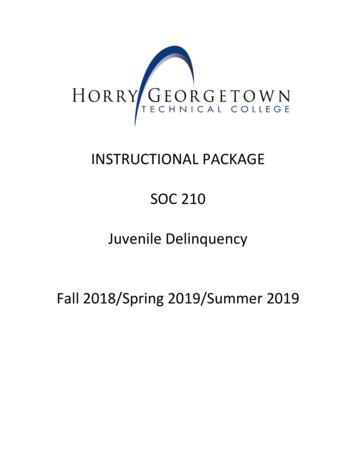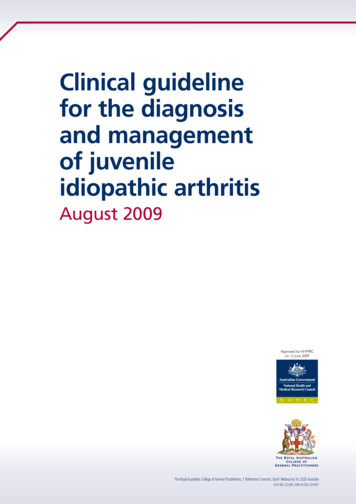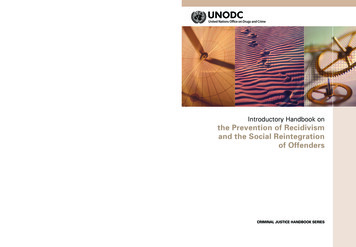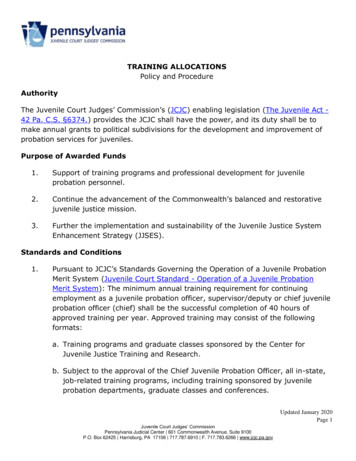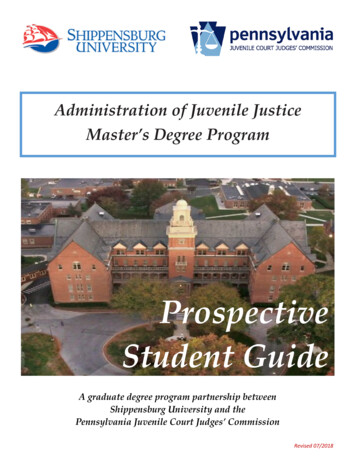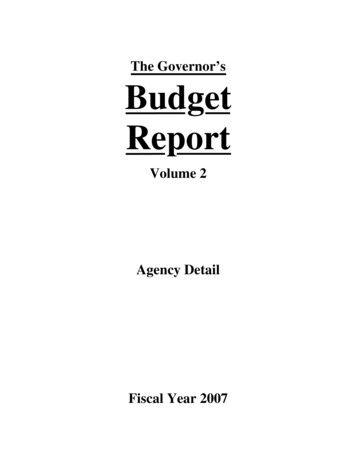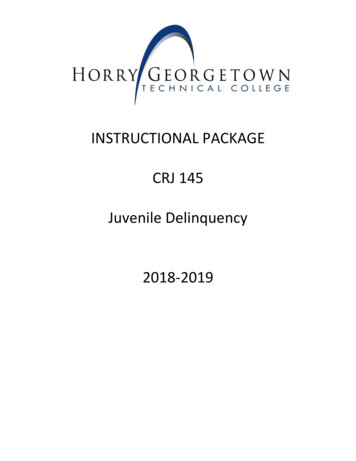
Transcription
INSTRUCTIONAL PACKAGECRJ 145Juvenile Delinquency2018-2019
INSTRUCTIONAL PACKAGEPART I: COURSE INFORMATIONEffective Term: 2018-2019COURSE PREFIX: CRJ 145COURSE TITLE: Juvenile DelinquencyCONTACT HOURS: 3.0CREDIT HOURS: 3.0RATIONALE FOR THE COURSE:This course is designed to provide the criminal justice student with an understanding of the historic andcurrent theories proposed through research to explain the causes of youth crime, and how theory becomespublic policy for the treatment of juvenile offenders. The course will provide an overview of substantive andprocedural law applicable to the juvenile justice system.COURSE DESCRIPTION:This course includes a survey of the sociological, biological and psychological theories involved in juveniledelinquency, modern trends in prevention and treatment. The course examines the juvenile process,procedure, and court. The phenomenon of the youth gang will be explored.PREREQUISITES/CO-REQUISITES:Prerequisite: CRJ 125 - Criminology with a C or better as a final gradeCorequisite: CRJ 101 - Introduction to Criminal JusticeREQUIRED MATERIALS:McNamara, R. H. (2014). Juvenile delinquency: Bridging theory to practice. New York: McGraw - Hill.Please visit the Bookstore online site for most current textbook information. Use the direct link below to findtextbooks.BOOKSTORE.Enter the semester, course prefix, number and section when prompted and you will be linked to the correcttextbook.ADDITIONAL REQUIREMENTS:CRJ 145 – Juvenile Delinquency does not have additional costs other than textbook, tuition, and fees.March 2018
TECHNICAL REQUIREMENTS:All criminal justice courses whether traditional on-the-ground, hybrid or online, require students to access thecourse in D2L through a personal computer. Therefore, students should have a reliable access to a computerwith a dependable Internet connection to be successful in this course or any criminal justice course. Studentswill be required to access, download, and/or print material from the course in D2L, which is accessible throughMy Courses and the student's WaveNet account. Students should pay particular attention to the courseoutline under Content as well as the course calendar. Students will be able to monitor grades and attendancethrough the course in D2L.Criminal justice courses, whether traditional, hybrid, or online require students to complete some, if not all,course work – assignments, exams, and other activities - through an online environment in D2L. Traditionalon-the-ground and hybrid require students to complete a portion of the required work online. The amount ofonline activity depends on the format of the course; therefore, students should pay particular attention to thecourse information and documents. Courses with an online component move very rapidly with gradedrequirements typically due each week. Students must be aware of the calendar and mindful of updates andannouncements; therefore, a student must have access to a reliable computer and a dependable Internetconnection. Criminal justice courses use D2L as a platform for course activities.When having technology problems find another computer. Computers are open to students at numerouslocations on all three campuses including open computer labs and the libraries. There are computers availablefor use in other public locations including the public libraries. A final option would be to contact a friend orrelative to borrow a computer. When technology issues are related to the system (i.e., D2L and WaveNet), andnot the result of a broken computer, you should contact Student Online Support OIT Help Desk at (843) 3495340 or through their link on the WaveNet homepage. Technology issues or technical problems are not anacceptable excuse should there be a course requirement that must be completed through D2L. When havingdifficulty with accessing the course or its components, or e-mail function, it is a good idea to notify yourprofessor about the problem or difficulty.STUDENT IDENTIFICATION VERIFICATIONStudents enrolled in online courses will be required to participate in a minimum of one (1) proctoredassignment and/or one (1) virtual event to support student identification verification. Please refer to yourInstructor Information Sheet for information regarding this requirement.CLASSROOM ETIQUETTE:All students are expected to conduct themselves in a professional and courteous manner at all times, andtoward all members of the class, whether online or on-the-ground in a traditional classroom setting. Thestandards of professional behavior will be enforced. Any violation associated with inappropriate behaviorincluding statements or remarks in class or in e-mails as well as postings or other communications will not betolerated. At the discretion of the professor of record, the inappropriate behavior may be reported in writingas a violation of the Student Code of Conduct under Proscribed Conduct, which could result in disciplinaryaction as described in College Catalog and Student Handbook (HGTC, 2014-2015, pp. 31-37).PART II: STUDENT LEARNING OUTCOMESMarch 2018
COURSE LEARNING OUTCOMES and ASSESSMENTS:UNIT I – NATURE OF DELINQUENCY; MEASURING DELINQUENCY; STATUS OFFENDING Material Covered: Juvenile delinquency: Bridging theory to practice, Chapters 1-3Student Outcome: Describe the history of American juvenile justice.Student Outcome: List and briefly describe the correlates to delinquency.Student Outcome: Identify and describe the main points in the Juvenile Delinquency Prevention andControl Act and its amendments.Student Outcome: Explain the difference between status offending and juvenile delinquency.Assessment: Quiz #1 (Chapters 1-3)Assessment: Discussion Assignment #1UNIT II - SOCIAL STRUCTURE AND SOCIAL PROCESS THEORIES OF DELINQUENCY; VIEWS OF DELINQUENCY Material Covered: Juvenile delinquency: Bridging theory to practice, Chapters 4-6Student Outcome: Describe the theoretical basis of the social structure explanation for delinquency andcrime.Student Outcome: Describe the theoretical basis of the social process explanation for delinquency andcrime.Student Outcome: Describe the theoretical basis of the social conflict explanation for delinquency andcrime.Student Outcome: Describe the labeling theory and its potential influence on delinquency.Assessment: Quiz #2 (Chapters 4-6)Assessment: Exam #1 (Chapters 1-6)UNIT III – FAMILIES, GANGS, AND SPECIAL POPULATIONS IN RELATION TO DELINQUENCY Material Covered: Juvenile delinquency: Bridging theory to practice, Chapters 7-9Student Outcome: Describe the implications of parenting on child behavior and delinquency.Student Outcome: Identify and describe some of the latest trends in gang behavior and how these trendsattract youths to join gangs.Student Outcome: Describe the implications for chronic juvenile offenders including sex offenders,arsonists, and dating violence.Student Outcome: Describe the causes of the increase in human trafficking involving juveniles in theworld, the U.S., and South Carolina.Assessment: Discussion Assignment #2Assessment: Quiz #3 (Chapters 7-9)UNIT IV – DELINQUENCY IN SCHOOLS; GENDER IN RELATION DELINQUENCY; DELINQUENCY PREVENTION Material Covered: Juvenile delinquency: Bridging theory to practice, Chapters 10-12.Student Outcome: Describe the burden placed on schools to solve societal problems.Student Outcome: Describe the modern school as a component of socialization.Student Outcome: Describe the potential causes of the increase in female delinquency.Student Outcome: Describe the various delinquency prevention programs in the U.S., and their success orfailure.March 2018
Assessment: Exam #2 (Chapters 7-9)Assessment: Discussion Assignment #3UNIT V – LAW ENFORCEMENT, THE COURTS, AND CORRECTIONS AND DELINQUENCY Material Covered: Juvenile delinquency: Bridging theory to practice, Chapters 13-15Student Outcome: Describe law enforcement perception of juveniles.Student Outcome: Describe the historical development of the juvenile justice system, and how the firstjuvenile court compares to the modern model.Student Outcome: Describe the difference between the juvenile justice system and the adult justicesystem including the issues.Student Outcome: Compare and contrast the juvenile corrections with the adult corrections includingdisposition, sentencing, and correctional facilities or institutions.Assessment: Quiz #4 (Chapters 10-15)Assessment: Exam #3 (Final Exam) (Chapters 10-15)PART III: GRADING AND ASSESSMENTStudents’ performance will be assessed and the weighted associated with the various measures listed below.EVALUATION (COURSE GRADING)*Exams . . 43.5%Assignments . 22.5%Quizzes . 34.0%100%*Students, for the specific number and type of evaluations, please refer to the Instructor’s CourseInformation Sheet.COLLEGE GRADING SYSTEM:90-100 80- 89 .70- 79 .60- 69 Below 60 ABCDFGrades earned in courses impact academic progression and financial aid status. Before withdrawing from acourse, be sure to talk with your instructor and financial aid counselor about the implications of that course ofaction. Grades of D, F, W, WF and I (Incomplete), also have a negative impact on a student’s academicprogression and financial aid status.The Add/Drop Period is the first 5 days of the semester for full-term classes. Add/Drop periods are shorter foraccelerated format courses. Please refer to the academic calendar for deadlines for endars.html). You must attend at least one meeting of all of your classesduring that period. If you do not, you will be dropped from the course(s) and your Financial Aid will be reducedaccordingly.March 2018
PART IV: ATTENDANCEAccording to the Horry-Georgetown Technical College Catalog (2016-2017) “College Students are responsiblefor all course work and class assignments; so, they are expected to regularly and promptly attend all meetingsof classes in which they are enrolled. Students should limit absences to those that are unavoidable and, withprofessor's consent, should make up all missed work, if permitted. Per SC Technical College Policy, HGTCmaintains a general attendance policy requiring students to be present for a minimum of 80% of classes to beeligible to receive credit for any course. However, a more rigid attendance policy may be required by theprogram of study. At a minimum, a student may be withdrawn from a course after he/she has been absent inmore than 10% of the total contact hours for a course. Professors define absentee limits for their classes atthe beginning of each term. Students withdrawn from a course due to excessive absences will receive a gradeof Withdraw ("W") up to the 2/3 point of the semester. Thereafter, a Withdraw ("W") or Withdraw Failure("WF") will be assigned, depending upon his/her academic status at the time of the last date attended.Students may be required to repay source of financial assistance for non-attendance, excessive absences orwithdrawals. Attendance records begin the first day of class for ALL students, regardless of registration date.Online and hybrid classes also require attendance and each instructor defines the method for students toindicate their class attendance by logging onto the class, participating in chats and/or submitting documents.Each student is responsible for awareness of the attendance requirements for each class” (p.45).The attendance for traditional courses will be determined by each student attending and participating in atraditional classroom meeting for the amount of time scheduled. Whereas, attendance for hybrid criminaljustice courses will be determined by each student attending and participating in a traditional classroommeeting for the amount of time scheduled as well as completing all online graded requirements and/orparticipating in the schedule activities for each particular week.Online attendance, whether completely online or a hybrid, is demonstrated through the studentcompleting the graded requirements and/or participating in the schedule activities for each particularweek. Participation in the scheduled activities includes but are not limited to posting an assignment to theDropbox, responding to a question in the discussion forum, completing an exam, test, or quiz or asdirected by the professor of record. However, an e-mail cannot be counted as attendance for onlinecriminal justice courses.Beginning with the first week of class, the number of class meetings online or on-the-ground will bedetermined based on the 80% attendance requirement. If a student misses 20% of scheduled meetings,whether online or on-the-ground, he(she) may be withdrawn by the professor of record for excessiveabsences without further notice. Please remember the graded requirements or activities are recorded fora score and attendance. Any student missing more than two (2) weeks without notification will bewithdrawn for excessive absences.Please be advised that simply logging into the course does not constitute participating for the purposes ofattendance.The attendance policy and requirements are published in the instructor’s addendum to course InstructionalPackage (IP) as well as in the course in D2L.Again, should any student not follow the announced attendance guidelines, which is in compliance with theCollege Attendance Policy, he(she) will be withdrawn from the course. A grade of “W” or “WF” will beassigned in accordance with course withdrawal procedures of Horry-Georgetown Technical College” (HGTC,March 2018
2015-2016, pp. 44-45). Again, students withdrawn due to excessive absences will not be readmitted to thecourse regardless of reason or excuse.Since the College maintains an attendance policy for all courses, including program offerings through an onlineformat, technology issues are not an excuse for not participating or missing a deadline for a gradedrequirement. Therefore, if for some reason access to the course or its functions is not available, immediatelynotify the Help Desk via the Live Help at http://www.hgtc.edu/, e-mail to HelpDesk@hgtc.edu, or telephone at(843) 349-5340. The Help Desk hours of operation are posted on WaveNet. Also, notify your course professor;so, he(she) is aware of the technology problems. Nevertheless, please be aware that technology issues orproblems are not an acceptable excuse for not participating as required for attendance, not completing anexam during the required time period (testing window), or failing to respond to a discussion assignmentbefore the required due date.Part V: Student ResourcesThe Student Success and Tutoring Center (SSTC)The SSTC offers to all students the following free resources:1. Academic coaches for most subject areas, Writing Center Support, and college success skills.2. On-line student success and academic support resources.Visit the SSTC website: Student Success & Tutoring Center and visit the student services tab in your WaveNetaccount to schedule appointments using TutorTrac. For more information, call: SSTC Conway, 349-7872; SSTCGrand Strand, 477-2113; and SSTC Georgetown, 520-1455. Room locations and Live Chat is available on theSSTC website.Student Information Center: WaveNet Central (WNC)WNC offers to all students the following free resources:1. Getting around HGTC: General information and guidance for enrollment!2. Use the Online Resource Center (ORC) for COMPASS support, technology education, and online tools.3. Drop-in technology support or scheduled training in the Center or in class.4. In-person workshops, online tutorials and more services are available.Visit the WNC website: Wavenet Central. Live Chat and Center locations are posted on the website. Or please call one ofthe following locations: WNC Conway, 349-5182; WNC Grand Strand, 477-2076; and WNC Georgetown, 520-1473.Student Testing: (If course is offered in multiple format include this section, delete if only F2F sections areoffered.)March 2018
Testing in an online/hybrid course may be accomplished in a variety of ways: Test administered within D2L Test administered in writing on paper Test administered through Publisher PlatformsFurther more tests may have time limits and/or require a proctor.Proctoring can be accomplished either face-to-face at an approved site or online through RPNow, our onlineproctoring service. To find out more about proctoring services, please visit the Online Testing section of theHGTC’s Testing Center webpage.The Instructor Information Sheet will have more details on test requirements for your course.Disability ServicesHGTC is committed to providing an accessible environment for students with disabilities. Inquiries may be directed toJocelyn Williams, Director of Student Development on the Conway Campus Jaime Davis, Counselor/Advisor on theGeorgetown Campus or Kristin Griffin, Counselor on the Grand Strand Campus. These individuals will reviewdocumentation of the student’s disability and, in a confidential setting with the student, develop an educationalaccommodation plan.Note: It is the student’s responsibility to self-identify as needing accommodations and to provide acceptabledocumentation. After a student has self-identified and submitted documentation of a disability, accommodations maybe determined, accepted, and provided.Statement of Equal Opportunity/Non-Discrimination StatementHorry Georgetown Technical College prohibits discrimination and harassment, including sexual harassment and abuse,on the basis of race, color, gender, national or ethnic origin, age, religion, disability, marital status, veteran status, sexualorientation, gender identity, or pregnancy in educational programs and/or activities.Title IX RequirementsHorry Georgetown Technical College prohibits the offenses of domestic violence, dating violence, sexual assault, andstalking. Any student who believe he or she has experienced or witnessed discrimination including sexual harassment,domestic violence, dating violence, sexual assault or stalking is encouraged to report such incidents to one of theCollege’s Title IX Coordinators.*Faculty and Staff are required to report incidents to the Title IX Coordinators when involving students. The onlyHGTC employees exempt from mandatory reporting are licensed mental health professionals (only as part oftheir job description such as counseling services).March 2018
Inquiries regarding the non-discrimination policies:Student and prospective student inquiriesconcerning Section 504, Title II, and Title IX andtheir application to the College or any studentdecision may be directed to the Associate VicePresident for Student Affairs.Dr. Melissa Batten, AVP Student AffairsTitle IX CoordinatorEmployee and applicant inquiries concerningSection 504, Title II, and Title IX and theirapplication to the College may be directed to theAssociate Vice President for Human Resources.Building 1100, Room 107A, Conway CampusBuilding 200, Room 212A, Conway CampusPO Box 261966, Conway, SC 29528-6066PO Box 261966, Conway, SC 49-5212Jacquelyne.Snyder@hgtc.eduMarch 2018Jacquelyne Snyder, AVP Human ResourcesSection 504, Title II, and Title IX Coordinator
McNamara, R. H. (2014). Juvenile delinquency: Bridging theory to practice. New York: McGraw - Hill. Please visit the Bookstore online site for most current textbook information. Use the direct link below to find textbooks. BOOKSTORE. Enter the semester, course prefix, number and se
